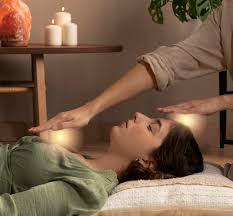
What is Reiki?
Understanding Reiki
Reiki, a Japanese therapeutic method developed by Mikao Usui in the early 20th century, is founded on the principle of energy flow and the body's natural ability to heal itself. Derived from the Japanese words "Rei" (universal) and "Ki" (life energy), Reiki translates to "universal life energy."
At its core, Reiki emphasizes restoring the natural flow of energy within the body to promote harmony and well-being. Practitioners channel this energy through their hands into the recipient to encourage relaxation and healing.
The Principles of Reiki
Reiki operates on five guiding principles that promote mindfulness, gratitude, and compassion:
- For today just, I will not be upset.
- I won't worry about it today.
- I'll be thankful just for today.
- I'll be honest in my job for today only.
- I promise to treat all living things with kindness today.
How Reiki Works
Reiki sessions are simple, tranquil, and non-invasive. The recipient lies fully clothed on a treatment table while the practitioner places their hands lightly on or just above specific areas of the body. The practitioner channels universal life energy into the recipient, which flows to areas in need of healing.
Sessions typically last 45 to 60 minutes and address the interconnectedness of the mind, body, and spirit. By clearing energy blockages, Reiki helps reduce stress, alleviate emotional pain, and support the body's natural healing processes.
Benefits of Reiki
- Relaxation and Stress Reduction: Reiki promotes profound relaxation, reducing stress and fostering a healing environment.
- Emotional Healing: Helps release negative emotions like anger, grief, and worry, encouraging emotional clarity and inner peace.
- Physical Health: Complements conventional medicine by reducing pain, accelerating healing, and enhancing vitality.
- Improved Spiritual Connection: Enhances self-awareness and deepens the bond with the universe.
- Better Sleep: Promotes restful sleep, benefiting those with insomnia or disturbed sleep patterns.
Reiki in Modern Times
Reiki has gained recognition in various healthcare settings, including hospitals, wellness centers, and hospices. It is often used to support patients undergoing treatments for chronic illnesses by alleviating side effects and improving quality of life.
Practitioners are trained and certified across levels, from beginners (Level 1) to advanced practitioners (Master Level). Distance Reiki, which transcends physical boundaries, is also offered by some practitioners, allowing healing energy to be sent across space and time.
Dispelling Myths About Reiki
While Reiki's non-physical nature may lead some to question its effectiveness, countless recipients report significant improvements in their physical, mental, and emotional well-being. Scientific research has also highlighted Reiki's potential to promote relaxation and reduce stress.
Embracing Reiki
Reiki is more than a healing technique; it is a philosophy of living in harmony with oneself and the universe. Its accessibility and simplicity make it an appealing choice for those seeking stress relief, emotional support, or a deeper spiritual connection.
By embracing Reiki, individuals tap into the body's natural ability to heal and embark on a journey toward vitality, harmony, and peace. Reiki serves as a reminder of the profound connection between energy, intention, and well-being.